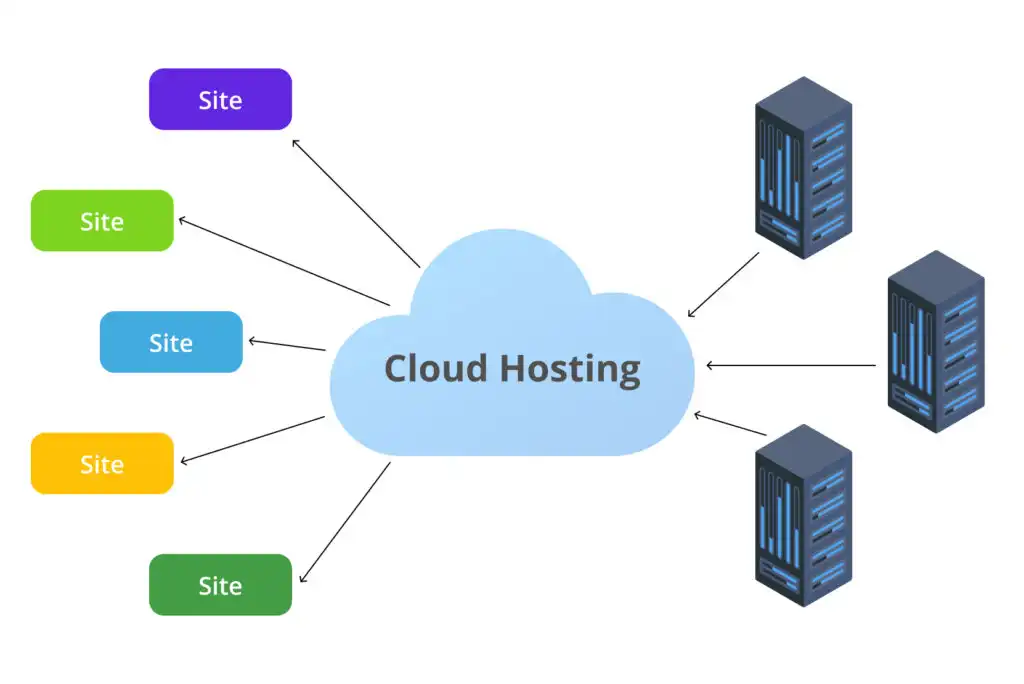In the ever-evolving digital world, businesses and individuals are constantly seeking ways to optimize their online presence. As websites grow and become more complex, traditional hosting solutions can sometimes fall short, especially when it comes to scalability, flexibility, and performance. Enter cloud hosting—a revolutionary hosting solution that offers unparalleled advantages over traditional hosting options like shared or dedicated hosting.
In this blog, we’ll explore the benefits of cloud hosting and explain why it’s becoming the future of web hosting. Whether you’re a small business owner or a large enterprise, cloud hosting can take your website’s performance and security to the next level.
1. Scalability and Flexibility
One of the most significant advantages of cloud hosting is its scalability. Unlike traditional hosting, which often requires you to upgrade your plan or purchase additional hardware to meet growing demands, cloud hosting offers the ability to easily scale resources up or down based on your needs.
Why it’s important:
-
Instant scalability: If your website experiences a traffic spike, you can quickly add more server resources without downtime or interruption.
-
Cost-effective: You only pay for the resources you use, which means you avoid overpaying for unused capacity.
Example: If you run an e-commerce site, cloud hosting allows you to handle increased traffic during peak shopping periods (like Black Friday) without compromising website performance.
2. Improved Performance and Speed
Cloud hosting typically provides faster website load times compared to traditional hosting solutions. This is because cloud hosting uses a network of servers that are geographically distributed. Your website’s content is stored on multiple servers, and when a user visits your site, it’s served from the closest server, reducing the time it takes for the page to load.
Why it’s important:
-
Reduced latency: By utilizing a global network of servers, cloud hosting reduces latency and improves user experience, especially for international audiences.
-
Higher uptime: Cloud hosting often provides 99.9% uptime guarantees, ensuring that your website remains accessible and performs at its best.
Tip: Cloud hosting is ideal for businesses with global audiences or websites that require high availability and performance.
3. Enhanced Security Features
Security is a top priority for any website, and cloud hosting provides some of the most advanced security features available. With cloud hosting, your data is backed up across multiple servers, making it more difficult for hackers or malicious actors to access your information.
Why it’s important:
-
Data redundancy: Since your data is mirrored across different servers, if one server experiences a failure, the system can switch to another, ensuring your website remains online and secure.
-
Advanced encryption and firewall protection: Cloud hosting providers offer end-to-end encryption, DDoS protection, and firewall security, providing robust protection against cyber threats.
Example: If your website handles sensitive customer data, such as payment information or personal details, cloud hosting provides the security features necessary to protect that data and comply with industry regulations (like GDPR or PCI DSS).
4. Automatic Backups and Disaster Recovery
Cloud hosting providers typically offer automatic backups of your website and data, ensuring that your website is protected in the event of a hardware failure, accidental deletion, or cyberattack. In case of a disaster, cloud hosting enables rapid disaster recovery, allowing you to restore your website quickly.
Why it’s important:
-
Peace of mind: Knowing that your website is backed up regularly reduces the risk of losing important data.
-
Quick recovery: In the event of a disaster, cloud hosting enables fast data restoration, minimizing downtime and business disruption.
Tip: Ensure your cloud hosting provider offers daily or weekly backups to safeguard your website and minimize potential losses.
5. Cost-Efficiency
While cloud hosting may initially seem like a more expensive option compared to shared hosting, it can actually be more cost-effective in the long run. With traditional hosting, you may end up paying for unused resources, but cloud hosting offers a pay-as-you-go model, allowing you to only pay for what you need and use.
Why it’s important:
-
Cost control: Cloud hosting allows you to scale resources based on actual usage, preventing over-provisioning and wasted expenses.
-
Flexible pricing: Many cloud hosting providers offer customizable pricing plans that cater to different budgets, from small businesses to large enterprises.
Example: A startup can begin with minimal resources and scale up as it grows, avoiding the upfront costs associated with traditional dedicated hosting.
6. Better Resource Management and Efficiency
With cloud hosting, the distribution of workloads across multiple servers ensures that your website’s resources are always utilized efficiently. This means that server resources like CPU power, RAM, and bandwidth are used optimally to provide the best performance.
Why it’s important:
-
Efficient load balancing: Cloud hosting automatically balances traffic across multiple servers to prevent any single server from being overloaded, ensuring smooth and uninterrupted website performance.
-
Reduced server downtime: By distributing traffic across multiple servers, cloud hosting ensures that if one server encounters issues, the others will handle the load without affecting your website.
Tip: Cloud hosting is a great solution for businesses with fluctuating traffic, as it ensures efficient resource allocation and eliminates performance bottlenecks.
7. Environmentally Friendly
Cloud hosting providers typically operate large-scale data centers with energy-efficient technologies that reduce carbon emissions. By using cloud services, your business can reduce its carbon footprint, which is an important consideration for environmentally conscious companies.
Why it’s important:
-
Energy-efficient data centers: Cloud hosting providers invest in green energy solutions, such as wind and solar power, to reduce the environmental impact of their services.
-
Sustainable practices: By hosting your website in the cloud, you’re supporting a more sustainable and energy-efficient way to manage digital resources.
Tip: Choosing a cloud hosting provider with a commitment to sustainability can help your business meet environmental goals and appeal to eco-conscious customers.
8. Easy Management and Maintenance
Cloud hosting services often come with user-friendly management dashboards that make it easy to monitor and manage your website’s performance, security, and resources. These dashboards allow you to quickly adjust your settings, view reports, and make changes without needing technical expertise.
Why it’s important:
-
No technical expertise required: Cloud hosting platforms are designed for ease of use, allowing even non-technical users to manage their websites effectively.
-
Automatic updates: Cloud hosting providers handle server maintenance and updates, so you don’t have to worry about keeping everything up to date.
Tip: Look for cloud hosting providers that offer intuitive control panels and customer support to streamline your website management experience.
Conclusion
Cloud hosting is revolutionizing the way websites are hosted, offering businesses of all sizes a scalable, secure, and cost-efficient solution for their online presence. With its improved performance, flexibility, and advanced security features, cloud hosting is fast becoming the future of web hosting.
Whether you’re looking to scale your website, improve security, or reduce hosting costs, cloud hosting can provide the solutions you need to stay ahead of the curve.

